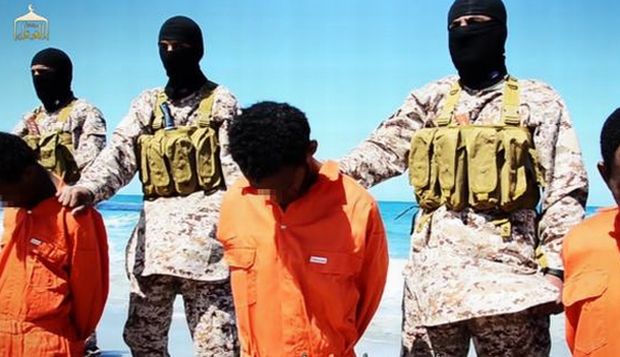
An image grab taken on April 19, 2015 from a video reportedly released by the Islamic State of Iraq and Syria (ISIS) group through Al-Furqan Media, one of the Jihadist platforms used by the militant organization on the web, purportedly shows men described as Ethiopian Christians captured in Libya kneeling on the ground in front of masked militants before their beheading on a beach at an undisclosed location in Libya. (AFP Photo)
Cairo, AP—A video released by the Islamic State of Iraq and Syria (ISIS) group on Sunday appears to show the killing of two different groups of captured Ethiopian Christians by the extremist group’s Libyan affiliates.
The 29-minute online video purports to show militants holding two groups of captives. It says one group is held by an ISIS affiliate in eastern Libya known as Barka Province and the other by an affiliate in the south calling itself the Fazzan Province.
A masked fighter brandishing a pistol delivers a long statement, saying Christians must convert to Islam or pay a special tax prescribed by the Qur’an.
The video then switches between footage of the captives in the south being shot dead and the captives in the east being beheaded on a beach.
It was not immediately clear who the captives were or when they were captured. It was also not clear how many captives were killed.
The video bore the official logo of the ISIS media arm Al-Furqan and resembled previous videos released by the extremist group, including one in February in which ISIS militants in Libya beheaded 21 captured Egyptian Christians on a beach.
ISIS group has been able to gain a foothold amid the chaos in Libya, where two governments backed by rival alliances of militias are battling each other as well as extremist groups.
The ISIS group is also advancing in Iraq, where the extremists captured three villages near the city of Ramadi in the western Anbar province and were locked in heavy clashes with Iraqi troops.
More than 90,000 people have fled the ISIS group’s advance in Anbar, a United Nations humanitarian agency said Sunday.
The Office for the Coordination of Humanitarian Affairs said in a statement that civilians are fleeing Ramadi as well as the three nearby villages captured by the ISIS group a few days ago. It said humanitarian agencies have moved quickly to provide assistance, including food, water and shelter.
“Our top priority is delivering life-saving assistance to people who are fleeing—food, water and shelter are highest on the list of priorities,” said Lise Grande, the UN humanitarian coordinator for Iraq.
Grande expressed concern over the safety of the displaced people, who are mainly heading to Baghdad and the ISIS-held city of Fallujah.
“Seeing people carrying what little they can and rushing for safety is heartbreaking,” she added.
Iraqi officials in Anbar have described Ramadi as a ghost town, with empty streets and closed shops.
Iraqi troops backed by Shi’ite militias and US-led airstrikes managed to dislodge the ISIS group from the northern city of Tikrit earlier this month.
But the troops have struggled against the militants in Anbar, which saw some of the heaviest fighting of the eight-year US military intervention that ended in 2011.
